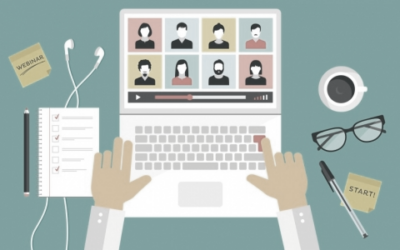Zoomed Out & Exhausted: Taking a Closer Look at our New Reality

You’re feeling this too, right? Crazy busy? Overworked? Exhausted? It seems everyone is. I’ve casually polled people across organizations and industries. Everyone is stressed and tired. The past several months, we’ve switched into overdrive. Gone are the pandemic days of leisurely mornings and daily lunch walks around the block. Now we are Zooming and Teams-ing from meeting to meeting to meeting, using early mornings and late evenings to prepare for these meetings and catch up on work. I had a friend tell me, he had 24 meetings in two days the other week. 24. Why?? Because we can.
We have figured out how to cram 10+ meetings into one day with video calls. We don’t have to travel from room to room or building to building or city to city. Instead, we can sit at our dining room table, and we’re in New York City, Seattle and then Italy in one Monday afternoon. And research out of Stanford is confirming the Zoom fatigue is real.1
For one, it isn’t natural to have the intense, close-up eye contact with people when your computer screen is a foot away from your face and the other person’s face is filling the screen. This distance is usually reserved for threatening or very intimate settings, so we are constantly in hyper-arousal mode in these meetings. It is also unnatural to be staring at your own reflection all day, and it can be damaging. Nowhere else in real-life do you constantly have a “mirror” held up to evaluate your appearance and your reactions. We are becoming more critical of ourselves. The number of Botox injections has gone up, which one beauty CEO called the ‘Zoom effect.’ To add to the cognitive load, we are not moving. Moving is good for our brains! We are scheduling back-to-back meetings and sitting the same spot all day long, while we try to keep our heads centered in our video square. Our mobility has significantly decreased.
My personal perspective (as a true Introvert) is that the emotional and cognitive load is even greater for our introverted friends. On video, we have to work harder to send and receive signals. Gestures and non-verbals have to be exaggerated. We have to over-emote in these video meetings. People are constantly looking at us, we have to show extra interest, over-exert our gestures and emotions… It is exhausting.
Yet we press on. In one study, employees self-report that their productivity has remained the same or increased over the past year.2 Approximately one-fifth of respondents say their employer doesn’t care about their work-life balance. Over half of the respondents feel overworked. Over a third feel exhausted. And the quantitative data matches the anecdotal. Some statistics from Microsoft:
- Time spent in Teams meetings has more than doubled globally
- The average Teams meeting is 10 minutes longer
- The average Teams user is sending 45 percent more chats per week and 42 percent more chats per person after hours
- The number of emails delivered to commercial and education customers in February, when compared to the same month last year, is up by 40.6 billion.
- There was a 66 percent increase in the number of people working on documents
- 62 percent of Teams calls and meetings unscheduled or conducted ad hoc.2
Working from home has intensified and expectations for employees have significantly increased. We can so easily schedule these virtual meetings, so we do. In our experience, everyone wants faster, shorter, now. We have made a shift from day-long, week-long programs, to two-hour leadership retreats or a series of 3, 2-hour virtual meetings to begin an organization-wide DE&I initiative… It doesn’t seem sustainable. We are producing more, being asked to do it faster, and then meeting Right. Now. To discuss. Here’s the Zoom link.
Experts are predicting that working from home and virtual meetings are not going away,2 so what do we do?
Here are a few tricks you can utilize support yourself throughout the day and help clients on virtual meetings and programs:
- Schedule meetings so they end 5 minutes shorter if they are less than an hour or 10 minutes shorter if they are an hour or longer. In the extra 10 minutes, walk to another room, stretch or move your laptop to a new environment. Take a bio break, so you can be re-energized for the next meeting.
- Don’t cram agendas, keep it spacious and allow for breaks when possible.
- Hide your self-view. This can feel scary- What if my hair looks crazy? Well, your hair has probably been out of place in real-life meetings, but you weren’t aware and no one cares; you’re not fully engaged if you’re staring at your own appearance the whole time.
- Normalize turning off your video. And let’s not forget, phone calls exist! Not every meeting needs to be a video call. Get work done on the phone while you take your daily walk around the block.
- Use Speaker Only view, so you’re not constantly scanning everyone’s face at one time. If we were in a room together, you’d be focusing mainly on whoever was sharing and not trying to read 15 others’ reactions at one time.
- Take Zoom out of the full-screen option and reduce the size of the Zoom window to minimize face size and allow an increase in the space between oneself and the screen. Also, consider where the camera is positioned and whether things like an external camera or keyboard can help create flexibility. Alleviate that hyper arousal state by putting some distance between you and your screen.
- Finally, keep your ‘work space’ and ‘personal life space’ as separate as possible. Move to a different room. Shut down the laptop fully. Don’t check your emails on your phone. We have to remember to care for ourselves, take breaks and turn off the screens.
In our coaching and our leadership development programs, we preach self-awareness and self-management at the core of being healthy, effective people. We need to be mindful of our stress levels and ensure that we are doing our renewal practices to support ourselves in being resilient individuals and leaders. Don’t forget to check in on your friends and loved ones. And if you are a leader, remember to connect with your team members on how they are managing and reconsider your expectations for their work output.
The early days of the pandemic seemed to provide us a new perspective on what is really important and what we want to prioritize. But we’re quickly forgetting and finding new ways to work harder and burn ourselves out. Are your values currently aligning with the life you are living and creating?
Featured News
The “New Normal” for Organizational Learning
It’s hard to believe the first day of fall is less than a week away. It is also hard to believe we’re over six months into the pandemic and the stresses and unexpected twists and turns that have come with it. In the move from face-to-face learning to virtual these...
Fostering Resonance in a Virtual World
Earlier this year, I began working with a new coaching client just as Covid-19 was making its way across the United States. Over the course of our work together, it became clear that one of her main goals was to build stronger relationships at work and create a more...
When Coaching Doesn’t Cut It
When I asked “When has that worked?” Stacy’s answer had a now-familiar tone: “It hasn’t worked. I’ve never figured this out.” In the couple months since our coaching sessions began, she easily traversed the range between frustration, despair, and dignified...




